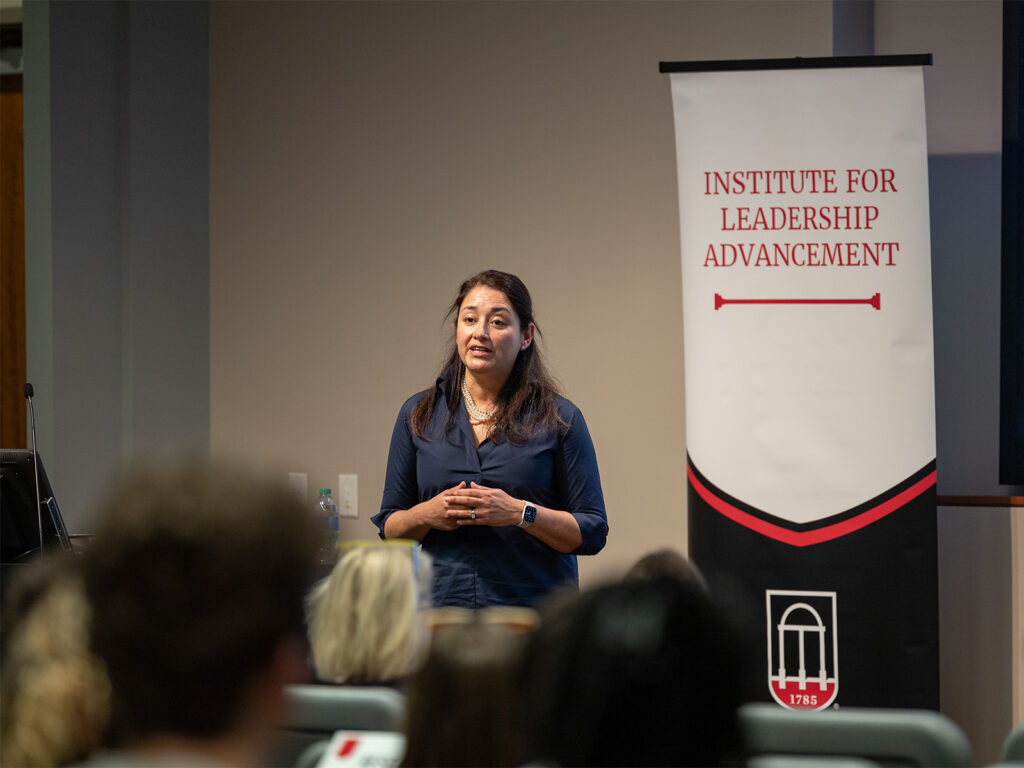Many times during her 30-year career, Col Monica Navarro Smith would look around a crowded conference room and realize she was the only woman there.
“You’ve all heard of groupthink,” Smith told a group of students gathered on March 27 for the University of Georgia Institute of Leadership Advancement’s Diversity and Inclusion Lecture Series.
“Similar people can tend to think the same way,” she said, describing personal experiences where she saw this unfold. “They were driven and intelligent, every single one of them. But it’s harder to innovate or disrupt or approach a problem creatively in a homogeneous group that leans toward consensus sooner.”
Today’s conference rooms and command centers are more diverse, but Smith thinks more work is needed. She serves as a colonel and is a former deputy commander of a combat communications group in the U.S. Air Force / Air National Guard and heads up digital governance, language preference, and risk management at Truist.
As a high school senior, Smith joined the U.S. Air Force / Air National Guard after getting into several colleges to pursue Engineering but was rejected by her dream college. In the end, her experience serving in the military has provided distinctive opportunities to lead from a very early age and given her life purpose.
In December, she was part of an effort tied to the United Nations Women, Peace, and Security initiative and visited the Romanian Air Force Academy to promote gender understanding and teamwork amongst Academy cadets. She has addressed the Romanian Ministry of National Defense and has been invited to return to Europe with a delegation this Spring to continue this work.
Smith also stressed the importance of working in a corporate setting that stands for something meaningful. For her, this setting is Truist Bank, and she touted the “purpose, mission and values” of Truist.
“Having a connection to something bigger than yourself can be so powerful when work gets stressful, or you have a bad day,” she said.
While balancing a military and corporate career has been challenging at times, her dual-path career helped her build leadership skills and hone her effectiveness. She wouldn’t be the type of authentic executive she is without her time in the military, and she might not be as effective an officer without the professional development and training of her civilian career.
“Your background provides distinct perspectives, starting with the lessons learned from your upbringing and family, sports and all your experiences,” she told students. The key to success is bringing that background and experience and diversity to work with you.
“It really can be your superpower,” she said.
She also urged students to invest the time to learn new skills, contribute new ideas to their teams as opportunities arise, and be part of the solution. “Be the person who takes on the job no one else steps up for, and then excel in it”.
“The biggest thing you need to do is bring something to the party — whatever that is,” Smith said. “If you don’t feel like you have something valuable to add to that meeting, email, or project, go get it. If it’s a skill and something you don’t know — go learn it.”
The annual ILA Diversity and Inclusion Lecture Series (DILS) at Terry College invites leaders from top organizations to share insights on their leadership styles and career experiences, focusing on how the speaker addresses diversity, equity, and inclusion challenges in the workplace and life.
Insight Global sponsors the 2022-2023 Diversity and Inclusion Series. They are consistently a Top 25 Employer of UGA students since 2015. Insight Global has 4,000 employees across 63 offices in the United States and Canada. In addition, they employ over 30,000 consultants. Their workforce is 70% female.
ILA is a privately funded unit within the Terry College of Business at the University of Georgia. ILA is an innovative, ever-evolving certificate program combining coursework with real-world experience to sharpen the next generation of leaders who stand out distinctly because of their unwavering commitment to making values-based, impact-driven decisions.

